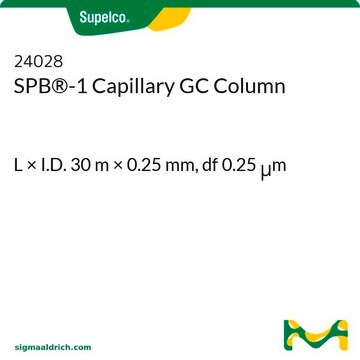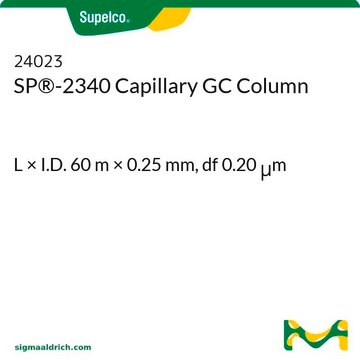25319
SP®-2380 Capillary GC Column
L × I.D. 30 m × 0.53 mm, df 0.20 μm
Faça loginpara ver os preços organizacionais e de contrato
About This Item
Código UNSPSC:
41115710
Produtos recomendados
Materiais
fused silica
Agency
meets requirements for USP G48
Parâmetros
≤25-275 °C temperature (isothermal or programmed)
Valor beta
663
df
0.20 μm
técnica(s)
gas chromatography (GC): suitable
C × D.I.
30 m × 0.53 mm
Grupo ativo da matriz
Stabilized; poly(90% biscyanopropyl/10% cyanopropylphenyl siloxane) phase
aplicação(ões)
agriculture
chemicals and industrial polymers
clinical
food and beverages
tipo de coluna
capillary highly polar
Procurando produtos similares? Visita Guia de comparação de produtos
Descrição geral
Capillary GC column is also known as open tubular column. The carrier gas flows through the central aperture and is unrestricted throughout the length of the column.
Application: A highly polar cyanosiloxane column commonly used for separation of geometric (cis/trans) fatty acid methyl ester (FAME) isomers as a group. Also useful when a highly polar general purpose column with good thermal stability is required.
USP Code: This column meets USP G48 requirements.
Phase:
USP Code: This column meets USP G48 requirements.
Phase:
- Stabilized
- Poly(90% biscyanopropyl/10% cyanopropylphenyl siloxane)
- Subambient to 275 °C (isothermal or programmed)
Aplicação
- SP®-2380 Capillary Column may be used for determination of fatty acid composition in crude oil in capillary gas chromatography, used along with normal and reverse-phase high-performance liquid chromatography (HPLC) in order to study the content and composition of tocopherols, sterols, and phospholipids in soybean oils derived from genetically-modified soybeans.
- It was found suitable to be used for the identification of fatty acid methyl esters from mammalian samples by fast gas chromatography.
- It was suitable for determining the hydrogenation level and the level of isomerisation development during the hydrogenation process of edible oils by capillary gas chromatography.
- It was also suitable to be used in gas chromatography equipped with flame ionization detector (FID) for analysing the cytotoxicity of fatty acids from seed oils containing conjugated linolenic acids (CLN) on mouse tumor and human monocytic leukemia cells.
Outras notas
We offer a variety of chromatography accessories including analytical syringes
Informações legais
SP is a registered trademark of Sigma-Aldrich Co. LLC
Choose from one of the most recent versions:
Já possui este produto?
Encontre a documentação dos produtos que você adquiriu recentemente na biblioteca de documentos.
Effect of genetic modification on the content and composition of bioactive constituents in soybean oil
Journal of the American Oil Chemists' Society, 73 (5), 581-586 (1996)
R Suzuki et al.
Lipids, 36(5), 477-482 (2001-07-04)
The cytotoxicity of fatty acids from seed oils containing conjugated linolenic acids (CLN) was studied. Fatty acids from pomegranate, tung, and catalpa were cytotoxic to human monocytic leukemia cells at concentrations exceeding 5 microM for pomegranate and tung and 10
Fast gas chromatography for the identification of fatty acid methyl esters from mammalian samples.
Stark K and Salem N.
Liposome Technology, 17 (8), 181-181 (2005)
E M Bondia et al.
Journal of chromatography. B, Biomedical applications, 658(2), 369-374 (1994-08-19)
Total fatty acids in plasma of neonates have been analysed as their methyl esters by gas chromatography. They were separated on a capillary column coated with a SP-2380 stationary phase. As little as 100 microliters of plasma is used for
Use of capillary gas chromatography for determining the hydrogenation level of edible oils.
Mateja N and Smidovnik A.
Journal of Chromatography A, 767 (1), 335-339 (1997)
Nossa equipe de cientistas tem experiência em todas as áreas de pesquisa, incluindo Life Sciences, ciência de materiais, síntese química, cromatografia, química analítica e muitas outras.
Entre em contato com a assistência técnica



